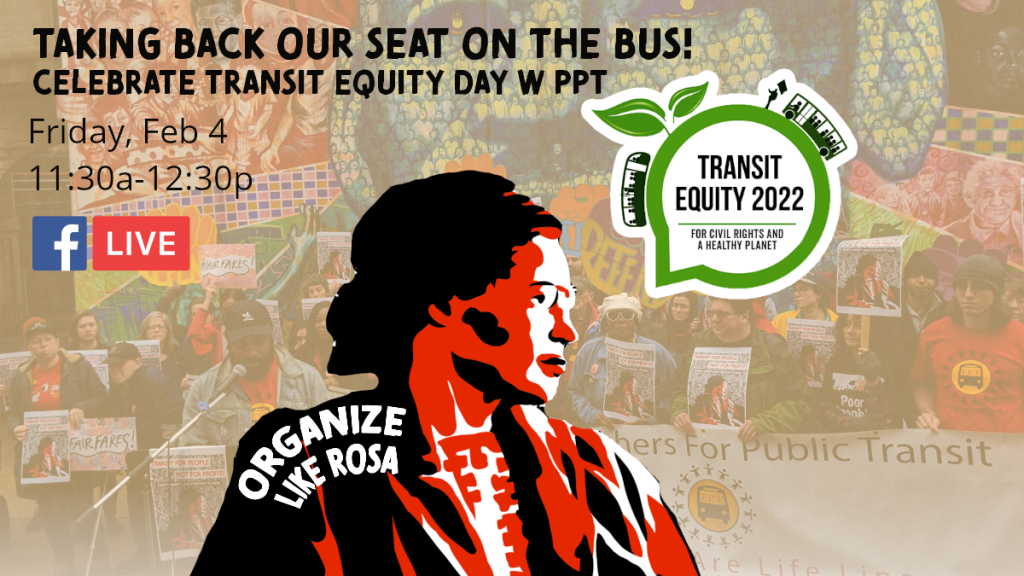
There is no justice without an organized demand.
Friday February 4th, Rosa Parks’ birthday, is National Transit Equity Day.
Pittsburghers for Public Transit and our friends are celebrating by holding an 11:30 am broadcast on Facebook Live to highlight how there is no justice without an organized demand.
Check out the FB Live Broadcast here
Through rider testimony around barriers to transit access and their desired solutions, and through a discussion of the history of the Montgomery Bus Boycott. We will recognize that Rosa Parks was a trained community organizer, and that her refusal to give up her seat was one tactic within a larger strategy of organizing transit riders to participate in a 13-month mass boycott of the transit system until buses were desegregated.
Thanks to New Voices for Reproductive Justice, Casa San Jose, and the E.A.T. Initiative for joining our broadcast to talk about the intersections of our work.
Learning More About the Organizing Legacy of Rosa Parks
Did you know this was part of an organized effort?
Rosa Park was not simply a streamstress who sat down on the bus after a long day of work, or the first person to be arrested for refusing to give up her seat to a white rider on a bus. Long before the Montgomery Bus Boycott, she was a skills operator, who was a secretary with the NAACP and was trained at the Highlander Folk School in Tennessee.
Rosa Park’s resistance to giving up her seat was an act of defiance in order to preserve dignity. Any act of resistance takes courage at the first step. It is important that we remember Rosa Parks not solely in this moment as a catalyst for change, but to remember and honor that skillful action at the right moments has lasting meaning. Without a strong coalition of commitment, these actions would be lost.
The elements that took a moment of resistance and boosted it into a movement was mutual aid and individuals pooling their resources (cars, bicycle sharing, mechanical expertise, ownership of gas stations, and careful-coordinating planning to raise funds and organize carpools) that kept an initial 1 day boycott of the buses to a 13 month strike. It took Black people from all walks of life to help one another. Without persistence and collective effort, the boycott would quickly dissolved.
Fast forward to the modern era and transit riders continue to build on a core philosophy. Those who refused to take the bus were demanding dignity. The essence of this issue that was present in the 1950s and 1960s, is still present today.
Bus symbolizes access to opportunities. Freedom of movement, the freedom to exist and live. Who has the system prioritized? Today, people in low-income communities, Black communities, and communities of color are unserved and pay a high price for this service.
For years, we have fought for affordable fares for low-income riders to meet their needs. Yet, there are fare-free zones in our system right now. While the Port Authority has zero fare service for routes on the Northside to stadiums on Steelers Sundays, riders on other routes saw a fare increase. These fare free zones are infrequently used compared to routes that service neighborhood-to-neighborhood connections, and are utilized by high-income, white riders. If our transit agency can make the choices on where to make fares relief, if it can make a choice to build rapid transit connections near new constructions, they can make the choice to invest in safe and dignified transit for the riders who have been historically excluded and deserved dignified mobility.
Some More Reading on Rosa and her organizing for justice
A Lifetime of Organizing: What Rosa Parks Can Teach Us
Library of Congress“Beyond the Bus: Rosa Parks’ Lifelong Struggle for Justice”